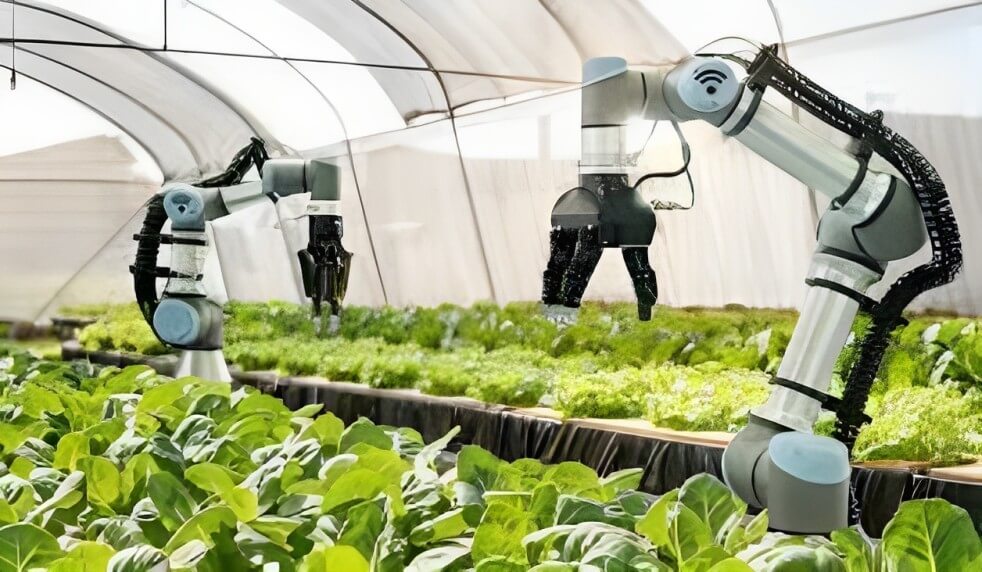Robotics is rapidly transforming the agricultural landscape, offering innovative solutions to boost crop production, minimize waste, and promote a more sustainable future for farming. By automating various tasks and leveraging advanced technologies, robots are addressing critical challenges such as labor shortages, environmental concerns, and the increasing demand for food.
One of the primary benefits of robotics in agriculture is the increase in efficiency and productivity. Robots can perform repetitive and time-consuming tasks with greater speed and accuracy than humans, enabling farms to operate around the clock. Tasks such as planting, weeding, fertilizing, and harvesting can be automated, optimizing resource use and minimizing waste. For instance, AI-powered agricultural robots can apply fertilizers, pesticides, and water precisely where and when needed, reducing waste, cutting input costs, and minimizing environmental impact. This targeted approach not only boosts yield but also promotes sustainability by reducing the overuse of chemicals that can lead to soil degradation and pollution.
Precision agriculture, which relies heavily on robotic technology, enables the focused application of resources like water, fertilizers, and pesticides. By using advanced sensors, drones, and AI-driven systems, robots gather detailed information on crop health, soil conditions, and environmental factors. This data is analyzed in real-time, allowing for precise application of inputs. Automated irrigation systems, for example, use data from soil moisture sensors and weather forecasts to deliver the exact amount of water needed by crops, reducing water waste and preventing over-irrigation. Similarly, robots that monitor soil health can ensure that fertilizers are applied only when necessary, avoiding the overuse of chemicals that can lead to soil degradation and pollution.
Robotics also plays a significant role in minimizing waste in agriculture. As much as 34% of produce is wasted before it even leaves the field due to labor problems and other inefficiencies. Robotic solutions can help meet this shortfall and reduce food loss, which is a major contributor to greenhouse gas emissions. For example, robotic harvesting systems can identify ripe fruits and vegetables and harvest them at a speed unattainable by human workers, ensuring that produce is collected at its nutritional and taste peak. Furthermore, automation in food production and processing can minimize food waste by handling variations in raw materials, such as different sizes and variations of organically grown vegetables. Camera technology, artificial intelligence, and collaborative robots are increasing the ability to deal with the huge variation in raw material.
In addition to increasing efficiency and minimizing waste, robotics promotes sustainable agricultural practices. Many autonomous machines are electric-powered, reducing reliance on fossil fuels and lowering carbon emissions. Robotic soil sensors and autonomous tillage machines reduce over-tillage, helping to maintain soil health and promote long-term land resilience. Furthermore, robotic weeders can eliminate weeds without the use of chemical pesticides, minimizing the amount of dangerous chemicals used in agricultural practices. Lightweight swarm robots can also reduce soil compaction and positively impact vegetation.
The integration of AI with robotics is further enhancing the capabilities of agricultural systems. AI algorithms can analyze vast amounts of data collected by sensors and drones to provide farmers with precise recommendations for crop management and decision-making. AI can also detect plant diseases, optimize fertilizer use, and predict yields, leading to significant economic and environmental benefits. Moreover, AI-powered robots can monitor livestock health, track food intake, and detect early signs of illness, enabling farmers to take proactive measures and improve animal welfare.
Despite the numerous benefits, the adoption of robotics in agriculture also faces challenges. The initial investment in drones and robotic technology can be significant, and many businesses find the prospect of integrating new AI-powered solutions daunting. However, as technology advances and costs decrease, robotics is becoming more accessible to farmers of all sizes. Additionally, governments and organizations are providing support and funding to promote the adoption of AI and robotics in agriculture, recognizing their potential to transform the industry and ensure a sustainable food supply for the future.

















